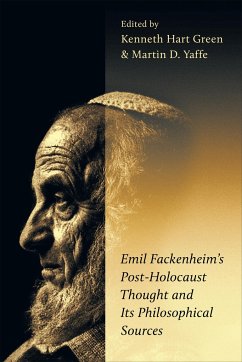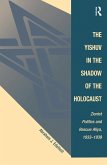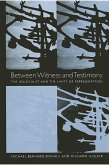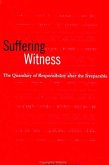Kenneth Hart Green, Martin D. Yaffe
Emil Fackenheim's Post-Holocaust Thought and Its Philosophical Sources
Herausgeber: Green, Kenneth Hart; Yaffe, Martin D
Kenneth Hart Green, Martin D. Yaffe
Emil Fackenheim's Post-Holocaust Thought and Its Philosophical Sources
Herausgeber: Green, Kenneth Hart; Yaffe, Martin D
- Broschiertes Buch
- Merkliste
- Auf die Merkliste
- Bewerten Bewerten
- Teilen
- Produkt teilen
- Produkterinnerung
- Produkterinnerung
Emil Fackenheim’s Post-Holocaust Thought and Its Philosophical Sources engages with the philosophers who made the greatest impact on the thought of Emil Fackenheim.
Andere Kunden interessierten sich auch für
![The Cunning of History The Cunning of History]() Richard L RubensteinThe Cunning of History15,99 €
Richard L RubensteinThe Cunning of History15,99 €![Justice Behind the Iron Curtain Justice Behind the Iron Curtain]() Gabriel FinderJustice Behind the Iron Curtain44,99 €
Gabriel FinderJustice Behind the Iron Curtain44,99 €![The Yishuv in the Shadow of the Holocaust The Yishuv in the Shadow of the Holocaust]() Abraham J EdelheitThe Yishuv in the Shadow of the Holocaust65,99 €
Abraham J EdelheitThe Yishuv in the Shadow of the Holocaust65,99 €![Between Witness and Testimony Between Witness and Testimony]() Michael Bernard-DonalsBetween Witness and Testimony33,99 €
Michael Bernard-DonalsBetween Witness and Testimony33,99 €![East West Street East West Street]() Philippe SandsEast West Street17,99 €
Philippe SandsEast West Street17,99 €![Violence in Islamic Thought from European Imperialism to the Post-Colonial Era Violence in Islamic Thought from European Imperialism to the Post-Colonial Era]() Violence in Islamic Thought from European Imperialism to the Post-Colonial Era36,99 €
Violence in Islamic Thought from European Imperialism to the Post-Colonial Era36,99 €![Suffering Witness Suffering Witness]() James D HatleySuffering Witness33,99 €
James D HatleySuffering Witness33,99 €-
-
-
Emil Fackenheim’s Post-Holocaust Thought and Its Philosophical Sources engages with the philosophers who made the greatest impact on the thought of Emil Fackenheim.
Produktdetails
- Produktdetails
- Verlag: University of Toronto Press
- Seitenzahl: 316
- Erscheinungstermin: 17. November 2021
- Englisch
- Abmessung: 226mm x 152mm x 18mm
- Gewicht: 440g
- ISBN-13: 9781487529659
- ISBN-10: 1487529651
- Artikelnr.: 61645233
- Herstellerkennzeichnung
- Libri GmbH
- Europaallee 1
- 36244 Bad Hersfeld
- gpsr@libri.de
- Verlag: University of Toronto Press
- Seitenzahl: 316
- Erscheinungstermin: 17. November 2021
- Englisch
- Abmessung: 226mm x 152mm x 18mm
- Gewicht: 440g
- ISBN-13: 9781487529659
- ISBN-10: 1487529651
- Artikelnr.: 61645233
- Herstellerkennzeichnung
- Libri GmbH
- Europaallee 1
- 36244 Bad Hersfeld
- gpsr@libri.de
Kenneth Hart Green is a professor in the Department for the Study of Religion at the University of Toronto. Martin D. Yaffe is a professor in the Department of Philosophy and Religion at the University of North Texas.
Introduction
Abbreviations
1. Emil Fackenheim on Moses Maimonides and the "One Great Difference
between the Medievals and the Moderns"
Benjamin Lorch, Michigan State University
2. Emil Fackenheim’s Jewish Correction of Kant’s Quasi-Christian
Eschatology
Martin D. Yaffe, University of North Texas
3. The Meaning of History: Knowledge of Good and Evil in Hegel and
Fackenheim
Paul Wilford, Boston College
4. Strategies of Jewish Hegelianism: Emil Fackenheim and Samuel Hirsch
Martin Kavka, Florida State University
5. Can Philosophy Be Positive? The Place of Schelling in the Thought of
Emil Fackenheim
Jeffrey A. Bernstein, College of the Holy Cross
6. Emil Fackenheim’s Way from Presence to History: Its Grounding in a
Critique of Rosenzweig on Revelation
Kenneth Hart Green, University of Toronto
7. Fackenheim and Buber on Revelation: Re-evaluating the Existential and
Historical Turn Away from Philosophy
Steven Kepnes, Colgate University
8. To Captivate the Jewish Thinker: Fackenheim’s Ontological Encounter with
Heidegger
Waller R. Newell, Carleton University
9. Philosophy in the Age of Auschwitz: Emil Fackenheim and Leo Strauss
Kenneth C. Blanchard, Jr., Northern University
10. Wiesel and Fackenheim: Philosophy and the Problem of Persecution
Sharon Portnoff, Connecticut College
Contributors
Index
Abbreviations
1. Emil Fackenheim on Moses Maimonides and the "One Great Difference
between the Medievals and the Moderns"
Benjamin Lorch, Michigan State University
2. Emil Fackenheim’s Jewish Correction of Kant’s Quasi-Christian
Eschatology
Martin D. Yaffe, University of North Texas
3. The Meaning of History: Knowledge of Good and Evil in Hegel and
Fackenheim
Paul Wilford, Boston College
4. Strategies of Jewish Hegelianism: Emil Fackenheim and Samuel Hirsch
Martin Kavka, Florida State University
5. Can Philosophy Be Positive? The Place of Schelling in the Thought of
Emil Fackenheim
Jeffrey A. Bernstein, College of the Holy Cross
6. Emil Fackenheim’s Way from Presence to History: Its Grounding in a
Critique of Rosenzweig on Revelation
Kenneth Hart Green, University of Toronto
7. Fackenheim and Buber on Revelation: Re-evaluating the Existential and
Historical Turn Away from Philosophy
Steven Kepnes, Colgate University
8. To Captivate the Jewish Thinker: Fackenheim’s Ontological Encounter with
Heidegger
Waller R. Newell, Carleton University
9. Philosophy in the Age of Auschwitz: Emil Fackenheim and Leo Strauss
Kenneth C. Blanchard, Jr., Northern University
10. Wiesel and Fackenheim: Philosophy and the Problem of Persecution
Sharon Portnoff, Connecticut College
Contributors
Index
Introduction
Abbreviations
1. Emil Fackenheim on Moses Maimonides and the "One Great Difference
between the Medievals and the Moderns"
Benjamin Lorch, Michigan State University
2. Emil Fackenheim’s Jewish Correction of Kant’s Quasi-Christian
Eschatology
Martin D. Yaffe, University of North Texas
3. The Meaning of History: Knowledge of Good and Evil in Hegel and
Fackenheim
Paul Wilford, Boston College
4. Strategies of Jewish Hegelianism: Emil Fackenheim and Samuel Hirsch
Martin Kavka, Florida State University
5. Can Philosophy Be Positive? The Place of Schelling in the Thought of
Emil Fackenheim
Jeffrey A. Bernstein, College of the Holy Cross
6. Emil Fackenheim’s Way from Presence to History: Its Grounding in a
Critique of Rosenzweig on Revelation
Kenneth Hart Green, University of Toronto
7. Fackenheim and Buber on Revelation: Re-evaluating the Existential and
Historical Turn Away from Philosophy
Steven Kepnes, Colgate University
8. To Captivate the Jewish Thinker: Fackenheim’s Ontological Encounter with
Heidegger
Waller R. Newell, Carleton University
9. Philosophy in the Age of Auschwitz: Emil Fackenheim and Leo Strauss
Kenneth C. Blanchard, Jr., Northern University
10. Wiesel and Fackenheim: Philosophy and the Problem of Persecution
Sharon Portnoff, Connecticut College
Contributors
Index
Abbreviations
1. Emil Fackenheim on Moses Maimonides and the "One Great Difference
between the Medievals and the Moderns"
Benjamin Lorch, Michigan State University
2. Emil Fackenheim’s Jewish Correction of Kant’s Quasi-Christian
Eschatology
Martin D. Yaffe, University of North Texas
3. The Meaning of History: Knowledge of Good and Evil in Hegel and
Fackenheim
Paul Wilford, Boston College
4. Strategies of Jewish Hegelianism: Emil Fackenheim and Samuel Hirsch
Martin Kavka, Florida State University
5. Can Philosophy Be Positive? The Place of Schelling in the Thought of
Emil Fackenheim
Jeffrey A. Bernstein, College of the Holy Cross
6. Emil Fackenheim’s Way from Presence to History: Its Grounding in a
Critique of Rosenzweig on Revelation
Kenneth Hart Green, University of Toronto
7. Fackenheim and Buber on Revelation: Re-evaluating the Existential and
Historical Turn Away from Philosophy
Steven Kepnes, Colgate University
8. To Captivate the Jewish Thinker: Fackenheim’s Ontological Encounter with
Heidegger
Waller R. Newell, Carleton University
9. Philosophy in the Age of Auschwitz: Emil Fackenheim and Leo Strauss
Kenneth C. Blanchard, Jr., Northern University
10. Wiesel and Fackenheim: Philosophy and the Problem of Persecution
Sharon Portnoff, Connecticut College
Contributors
Index








